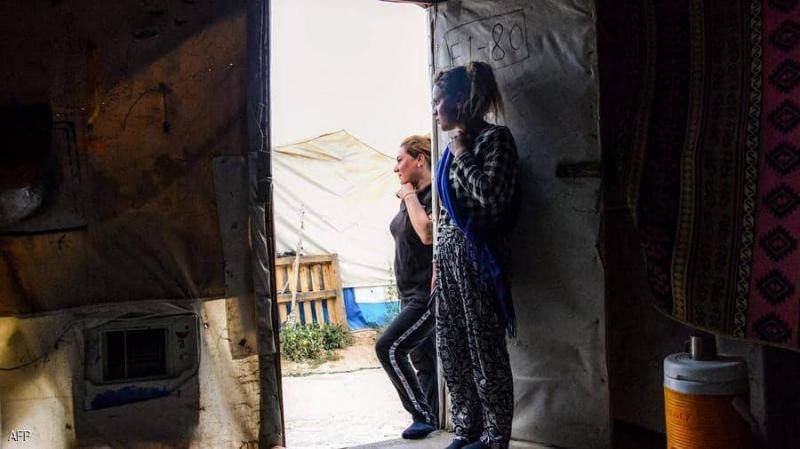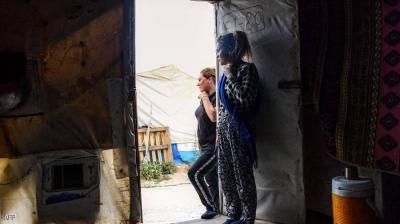The displaced Yazidis have disregarded the promises made by the Iraqi Minister of Migration and Displaced Persons, Ivan Faik, during her visit to the "Sharya" camp in the Kurdistan region of Iraq following a massive fire there. The lack of trust stems from the fact that new promises have been added to old ones for a community that has suffered tremendously since ISIS invaded their homeland in the Sinjar region in 2014, leading to genocide. Yazidi activists believe that the only solution to end their plight is to open migration pathways to European countries, especially in light of reports about Baghdad’s intention to bring back a number of ISIS families from Syria, which frightens the Yazidis.
Despite ISIS's defeat and the Iraqi forces regaining control over all regions, the majority of Yazidis who sought refuge in Kurdistan remain there due to the failure to implement a return agreement between Baghdad and Erbil. Amidst this, a major fire consumed more than 400 tents in the "Sharya" camp on Friday evening, exacerbating their tragedy. Mahma Khalil, the mayor of the Sinjar district, criticized the Ministry of Migration and Displacement for its negligence and the federal government's failure to ensure the safety of the camp, describing the fire incident, which burned around 400 tents, as a "humanitarian tragedy." Khalil called on relevant authorities and humanitarian organizations to compensate those affected and find fundamental solutions to their plight.
Sharp criticisms have arisen, with activists sharing a video on social media showing Minister Ivan Faik facing harsh criticism from the affected Yazidis during her visit to the Sharya camp, where they protested around her, demanding her departure, leading security forces to intervene to protect her. Angry displaced individuals described the Minister's promises as false and accused her of bringing ISIS families from the Al-Hol camp in air-conditioned buses to the "Jud'a" camp in Mosul instead of facilitating the return of Yazidis to their homes.
Regarding their demands, several Yazidi protesters explained to "Sky News Arabia" that their requests included urging the Baghdad government to stop the agreement for relocating ISIS families from Syria into Iraq and to focus on repatriating displaced Yazidis in the camps back to their homes in Sinjar, their original homeland in Iraq. A Yazidi activist, who chose to identify himself as "Khdr," mentioned to "Sky News Arabia" that they are appealing to the United Nations and the international community to rescue the kidnapped Yazidis and to address the status of displaced individuals by facilitating their migration to European countries for fear of new massacres that could be committed by ISIS elements and their families coming from Syria, with reports indicating a new wave of supporters of the organization heading to Iraq.
Khdr indicated that the vast majority of the Yazidi community is calling for the opening of migration pathways outside Iraq while providing international protection for those wishing to stay and not leave. He pointed out that the Ministry of Migration has evaded its promises to facilitate the return of displaced families, instead working to return the families of the organization who have terrorized the Yazidis, who are suffering under extremely harsh conditions. He confirmed that similar fires have ravaged Yazidi displacement camps in recent years, but the one that occurred on Friday was the most dangerous.
Additionally, the spokesperson for the Arab tribes in disputed areas, Sheikh Mazahim Al-Hwait, accused the Iraqi Minister of Migration of preparing to welcome a new wave of ISIS families currently residing in the Al-Hol camp in Syria. Al-Hwait stated to "Sky News Arabia": "Another 150 families from ISIS, estimated to number around 1,200 individuals, will enter Iraq coming from Syria." He noted that the Ministry of Migration had coordinated with non-governmental organizations to prepare food and medical supplies for the new group of families from the organization, who are to be relocated to Diyala province in the coming days.
A member of the Iraqi parliament from Nineveh, Shirwan Al-Dobardani, had warned of the dangers posed by the arrival of the first batch of ISIS families to Iraq, which consists of around 500 families. He stated that these individuals could represent a ticking time bomb threatening Iraqi security, emphasizing that the repercussions of this issue would lead to security disasters not only in Nineveh but throughout the country, as these families would be transferred to all Iraqi provinces.




